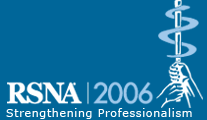
Abstract Archives of the RSNA, 2006
Jean-Luc Drape MD,PhD, Presenter: Nothing to Disclose
Fouad Fayad MD, Abstract Co-Author: Nothing to Disclose
Antoine Feydy MD, PhD, Abstract Co-Author: Nothing to Disclose
Henri Guerini MD, Abstract Co-Author: Nothing to Disclose
Michel Revel, Abstract Co-Author: Nothing to Disclose
Alain Chevrot MD, Abstract Co-Author: Nothing to Disclose
To assess the clinical response to intradiscal steroid injections in inflammatory degenerative disc disease
Inclusion criteriae were: severe low back pain resistant to medical treatment with associated bone marrow edema of the vertebral end-plates (Modic 1). Inclusion of 74 patients shared according to MRI findings between pure Modic 1 (group 1, n=37), mixed Modic with predominant edema (group 2, n=25), mixed Modic with fatty predominance (group 3, n=12). Intradiscal injection of 25 mg of prednisolone acetate at L5-S1 (n=33), L4-L5 (n=30), L3-L4 (n=5) and L2-L3 (n=6) levels. All patients were clinically assessed (low back pain AVS, disability AVS, Quebec Questionnaire, finger-to-floor test, modified Schober test, patient satisfaction) before the procedure, at the end of the hospitalization, at 1 month, 3 months and 6 months.
The results were considered as good or excellent with 50% or more improvement of low back pain AVS at the end of hospitalization (67% group 1, 60% group 2, 42% group3), at 1 month (49% group 1, 52% group 2, 8% group 3), 3 months (30% group 1, 28% group 2, 8% group 3) and 6 months (22% group 1, 16% group 2, 16% group 3). At the end of hospitalization, the AVS delta was not significantly different between the 3 groups, but significantly higher at 1 month for groups 1 and 2 (p=0.017) (Kruskal-Wallis test). At 1 month patient satisfaction was good or excellent in 49% group 1, 32% group 2 and 16% group 3.
The efficiency of steroid intradiscal injection on low back pain is significantly higher in case of pure or predominant Modic 1 changes associated with the degenerative disc disease during the month following the procedure. This injection stamps out an acute onset on a background of chronic low back pain.
Intradiscal steroid injection can stamp out a subacute low back pain fit in degenerative disc disease with associated pure or predominant Modic 1 changes.
Drape, J,
Fayad, F,
Feydy, A,
Guerini, H,
Revel, M,
Chevrot, A,
Inflammatory Degenerative Disc Disease: Assessment of Efficiency of Intradiscal Steroid Injections. Radiological Society of North America 2006 Scientific Assembly and Annual Meeting, November 26 - December 1, 2006 ,Chicago IL.
http://archive.rsna.org/2006/4431558.html

